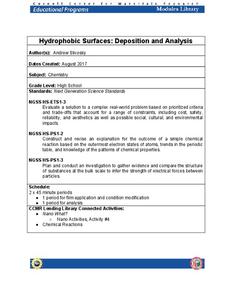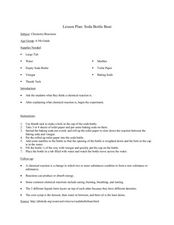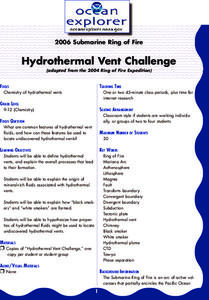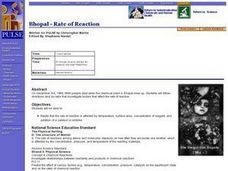Curated OER
Kitchen Chemistry
Fifth graders examine both physical and chemical changes, and how to identify the difference between the two. They observe the changes that occur in butter when it is exposed to heat and cold, heat energy. In their notebooks, they write...
Curated OER
Spontaneity, Disorder and Entropy
In this physical and chemical change worksheet, students calculate the entropy change involved in different chemical changes. This worksheet has 4 problems to solve.
Curated OER
UP AND ATOM
If you are willing to sort through this outline and overlook the portions relating to inaccessible videos, you will find a wealth of support for your introductory chemistry unit. Narrative is presented to help you help learners navigate...
Curated OER
Determination of a Rate Law
High schoolers determine the rate law for a chemical reaction. They use graphical techniques in the analysis of experimental data.
Curated OER
Programming the "Rinse Robot"
Experienced chemistry technicians use then layer chromatography to discover how much of a free compound is left after each rinse cycle. Where this could obviously be used as a practice with chromatography technique, it can also be used...
Virginia Department of Education
Mystery Iron Ions
Young chemists perform an experiment to determine if a compound is iron (II) chloride or iron (III) chloride. Then they determine the formula, balance the equation, and answer analysis questions.
Cornell University
Hydrophobic Surfaces—Deposition and Analysis
Couches, carpets, and even computer keyboards now advertise they are spill-resistant, but what does that mean? Scholars use physical and chemical methods to coat surfaces with thin films to test their hydrophobic properties. Then they...
Curated OER
Laboratory: Observing a Candle
In this observation worksheet, scientists observe a burning candle and answer eight post-lab questions. Topics include the phase changes occurring during the observations, the role each part of the candle plays in the chemical reaction,...
Cornell University
Build a Fuel Cell
Discover the connection between redox reactions and fuel cells. Collaborative groups build a Hoffmann Apparatus that demonstrates the electrolysis of water and then convert their models into a fuel cell. They use their fuel cells to...
Kenan Fellows
Qualitative Kinetics: Examining the Effect of an Enzyme on a Reaction
Scholars learn about kinetics and buffers as they use qualitative and quantitative methods to understand enzyme rates and buffer capacity. The application of Beer's Law and spectrophotometry solidifies pupils' knowledge in the first of...
Curated OER
Science: The States of Matter
Third graders conduct experiments in matter to create chemical changes resulting in gases. By mixing solids and liquids, they create a chemical reaction and capture the gas in balloons. After observing the balloons fill with carbon...
Curated OER
Oxidation and Combustion: Chemical Reactions in Fire
Students study oxidation and define vocabulary pertinent to it. In this oxidation lesson students make predictions and create experiments
Curated OER
Soda Bottle Boat
Students explore chemical reactions. In this chemical reaction lesson, students conduct an experiment observing chemical reactions.
Curated OER
Activity #6 How Fast Do Reactions Go?
Students name the factors (concentration, temperature, and a catalyst) which can affect the rate of a chemical reaction. They use their knowledge of particle theory to explain their observations. Pupils comprehend that the...
Alabama Learning Exchange
Writing Word Equations
Students explore the concept of chemical formulas. In this chemical formula instructional activity, students watch a video about balancing chemical equations. Students conduct an experiment using silver nitrate and sodium phosphate. ...
Curated OER
Changing Sugar
In this chemical and physical change worksheet, students use a sugar cube and observe its physical properties both when it is whole and after it is crushed. They heat the sugar cube and record 5 properties of the matter while being...
Curated OER
How Are The Properties of Covalent Compounds Influenced By Chemical Bonding?
Students work together to observe the bond lengths of single, double and triple bonds. They make their own predictions about the strength of the bonds and chemical reactions. They answer discussion questions to complete the lesson.
Curated OER
Salt Bridges
In this chemistry worksheet, students examine the salt bridge in order to apply in the laboratory setting. The sheet includes in depth background information.
Curated OER
Hydrothermal Vent Challenge
Give our ocean voyagers the "Hydrothermal Vent Challenge!" It is a worksheet that guides them through an exploration of hydrothermal vents and the chemical reactions that occur when lava meets seawater. Using a collection of websites,...
Virginia Department of Education
States of Matter
Scientists have been studying exothermic reactions before they were cool. The lesson begins with a discussion and a demonstration of heat curves. Scholars then determine the heat of fusion of ice and the heat needed to boil water through...
Curated OER
Predicting the pH of Salt Solutions
A single page provides you with lecture notes for your instructional activity on hydrolysis. Introduce your chemistry class to Bronsted-Lowry theory by explaining the hydrolysis of acidic cations and basic anions. Show them how the...
Curated OER
Bhopal - Rate of Reaction
Students determine that the rate of reaction is affected by temperature, surface area, concentration of reagent, and addition of a catalyst or inhibitor. They observe that on December 3rd, 1984, 8000 people died when the chemical plant...
Curated OER
Rusting-A Form of Oxidation
Young scholars conduct an experiment to observe oxidation. In this chemistry lesson, students explain how rusting happens. They rank metals according to their conductivity.
Curated OER
Oxidation: How Can It Be Proved?
Students explore the process of oxidation. In this lesson plan about oxidation, students observe four different demonstrations. Students watch examples of oxidation in order to understand the process. Students discuss the chemical...

























